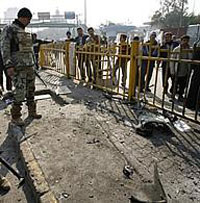Authorities recover 2nd motorcycle bomb to be used for Congress blast
Police discovered motorcycle bomb components in two Manila houses that were prepared for the second attack on a Muslim lawmaker. Last week he survived a bombing outside the legislature.

Three men, including at least one suspected Muslim militant, were arrested and facing murder charges in the Nov. 13 blast outside the Philippines House of Representatives that killed Rep. Wahab Akbar of southern Basilan province and three congressional staffers.
Police suspect the bomb, which was hidden in a parked motorcycle, was placed by Akbar's political rivals, possibly including militants from the al-Qaida-linked Abu Sayyaf group.
A former Muslim rebel-turned-politician, Akbar had been linked to the Abu Sayyaf but later backed military attacks against it. He also had many enemies as the head of a powerful political dynasty that has been running Basilan province.
Security forces, acting on information provided by the three detained suspects, raided a Manila apartment Monday and found parts of a second motorcycle and traces of nitrate, which is an explosives component, said army spokesman Lt. Col. Ernesto Torres.
Torres said the three suspects told authorities a bomb had been assembled in the area as an "alternate plan" to assassinate Akbar.
Near the house, authorities arrested a former Basilan town mayor, Harajon Jamiri, who was initially charged with illegal possession of firearms.
On late Tuesday, a second raid on another Manila house revealed more bomb components, Torres said. He said he suspected Jamiri disassembled the motorcycle bomb and hid the explosives in that house.
Torres said he had no information if Jamiri was an Abu Sayyaf member, but that, like Akbar, he used to be with the Muslim separatist Moro National Liberation Front. More recently, he helped authorities in negotiations that led to the release of a kidnapped Italian priest in the southern Philippines , Torres said.
Political violence and vendettas are common in the southern Philippines .
As Basilan governor in 2002, Akbar welcomed U.S. troops who trained Filipino soldiers battling the Abu Sayyaf. Over the years, the island was gradually transformed from a militant hotbed into a showcase of counterterrorism success and humanitarian development.
Subscribe to Pravda.Ru Telegram channel, Facebook, RSS!


